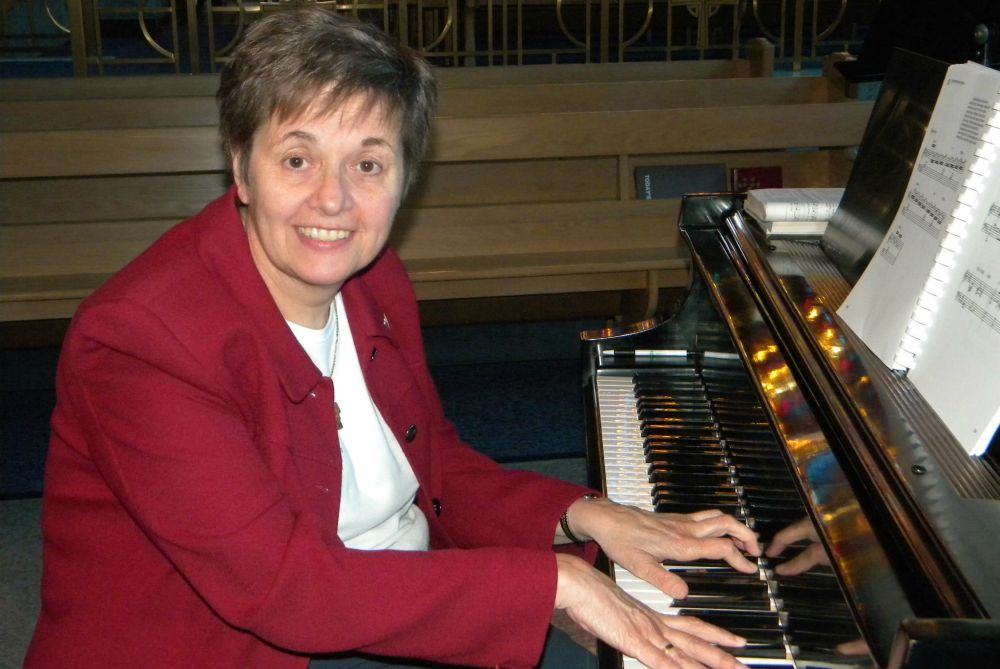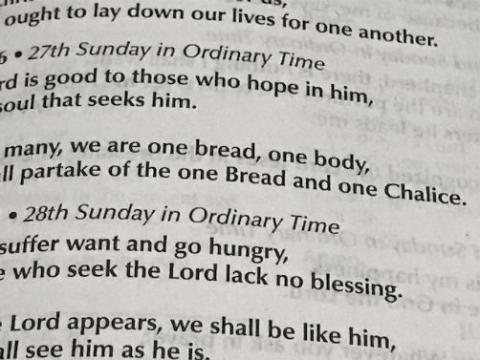
Sr. Karen Jean Zielinski at the piano (Provided photo)
Therefore, my beloved brothers and sisters, be firm, steadfast, always fully devoted to the work of the Lord, knowing that in the Lord your labor is not in vain.
—1 Corinthians 15:58
I was in my doctor's waiting room this summer and picked up the December issue of Woman's Day magazine. I scanned it; there were lovely holiday decorating ideas, cooking instructions and recipes, and something that caught my attention: a little box with some "facts."
I was surprised by two things about the magazine. First, it was a rather current magazine, a six-month-old issue and not the three-year-old issue we joke about being in doctors' waiting rooms. Secondly, it told me about how we Americans carry out our New Year's resolutions, if we even make them.
The neat little box told me that:
100 million Americans make New Year's resolutions
80% don't keep them
35% don't even stick it out past January 31
I know I was part of those statistics in every category, but I wondered, why can't we try to stick to the New Year's resolution even if we failed once? What is wrong with starting again in March or April? When we go on a road trip and we take a wrong exit or our Global Positioning System steers us out of the way, eventually we correct our mistakes and find our destination. We get there, but we had to start again. So what? We made it to our destination.
The winter and fall months have passed, and now we are looking at the middle months of the year. We waited for spring and remember our New Year's resolutions (if we made any) with guilt, probably because we did not keep them or we stopped after a few weeks.
By the end of January, we might have stopped our medication and vitamin regimes, or our community volunteering, or our plans to make smoothies to lose weight. The start of a new program, a course at a local college or other "starts" inspire us. We are energized and challenged about what we can learn, do, or how we will be different in those next weeks or months.
Then reality sets in. We miss our volunteer day because of inclement weather or an illness in the family. Sometimes our goals of eating sensibly and exercising three times a week are abruptly stopped. We just are not disciplined enough to continue. We start off with sincere determination to use our local gym's exercise program, and then get home from work, throw in a load of laundry and fold towels on top of our television set. Life happens, and we just stop our resolutions completely.
But there is hope! Why can't we do a mini-start or beginning of some never-realized plans in the middle of the year? We are still starting again, and going back to what we planned and stopped. Starting over in the middle is better than not doing anything.
These "stuff in the middle" resolutions are still resolutions we can do. People who teach high school music for 25 years, or who are married for decades, are honored — and rightfully so! They are honored, I think, for the stuff that happened in the middle of their commitments. It is sticking to the beginnings they chose and celebrating the endings for what they set out to do for a specific time. Retiring after 30 years of doing something at a job means the person honored stuck to their job.
Advertisement
Celebrating an anniversary means a married couple followed through on their beginning (their marriage vows). The beginnings and ends, or celebrations, are great. But it is the faithfulness to the in-between time that is inspiring. Carrying on even if you have some stumbles or mistakes is what is honored. Faithfulness is what is at work here. Sometimes, we do not realize the significance of our sticking with a commitment to volunteering, spending time each day in meditation and prayer, or calling an elderly family member or friend.
Being faithful to anything requires much generosity. It is the behind-the-scenes activities that might not seem glamorous or important. When we commit to parish work, it might mean we take the Eucharist to someone who is ill, call a widow or someone who has mental illness, or clean tables at our parish after a funeral luncheon.
The discipline of honoring any commitment reminds me of the years I practiced piano at home in Detroit. I took lessons from Sister Sophia and had to practice between lessons. My mother helped me be faithful to the commitment of learning the piano. (She made me practice!) As a young kid, I wanted to quit lessons so I could go out after school and play with my neighborhood friends. My mother made me be faithful, and I got pretty good at playing the piano, receiving a master's in music in piano performance and choral conducting.
Little did I realize that the in-between middle time would play a critical part in my life.

A clip from the liturgical year (Karen J. Zielinski)
I think the faithfulness I see in the "ordinary time" of the church's liturgical year reminds me of the sacred significance of sticking to our volunteering, prayer and healthy practices. When I hear a beautiful piano performance, I am reminded of the discipline a person went through to become accomplished as a musician.
So be encouraged, start again. The "stuff in the middle" is challenging but a part of life. Like the white stuff in Oreo cookies or the middle pieces of a good loaf of bread, it is simply a part of the whole. Enjoy the whole loaf, the whole New Year's or md-year's resolution, wherever you are in your resolution or commitment.
The big thing is not when you fail or stumble at your goals, it is that you keep trying to be faithful. Even in the middle of the year …
[Karen Jean Zielinski is a member of the Sisters of St. Francis of Sylvania, Ohio. Her first book, Hope and Help for Living With Illness, deals with health and spirituality. She is co-director of associates and director of Canticle Studio, a creative office of products that focus on spirituality and health.]





